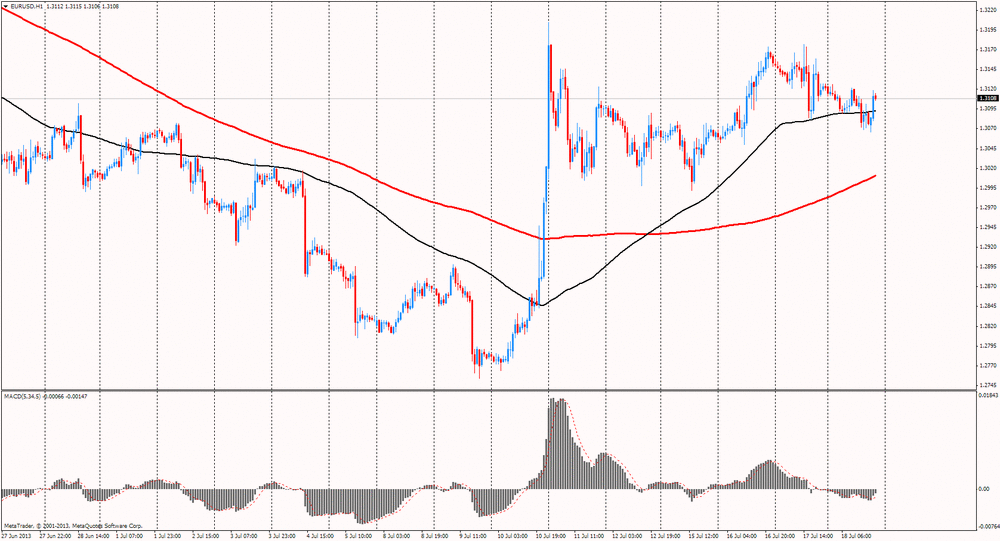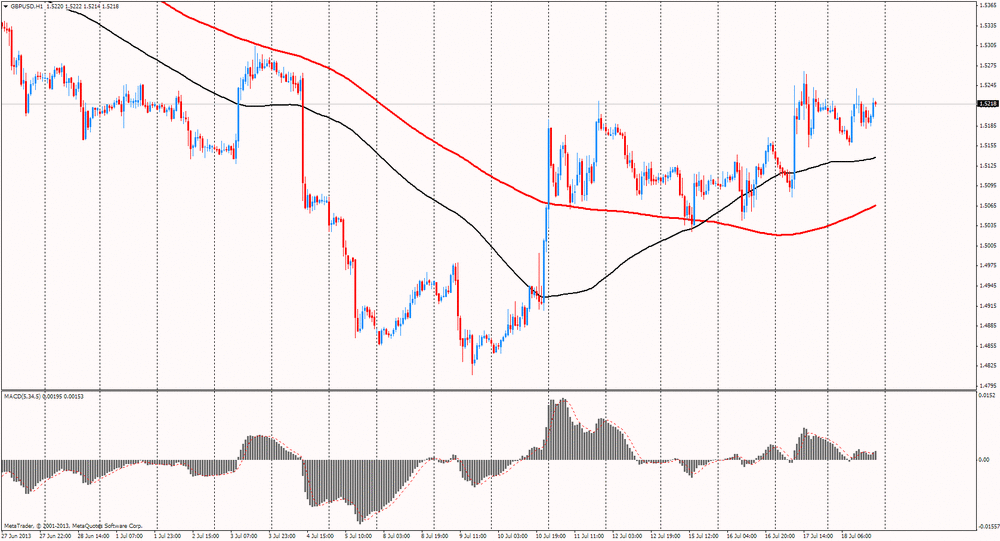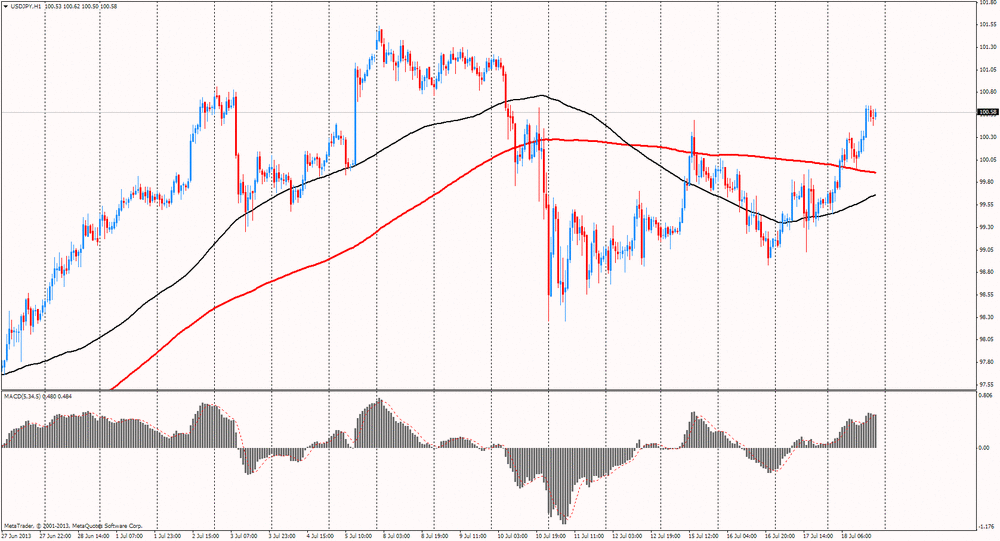- Analytics
- News and Tools
- Market News
- American focus: the euro rebounded from lows against the dollar
American focus: the euro rebounded from lows against the dollar
The euro rose sharply against the dollar, recovering with most of the previously lost positions. Note that the initial pressure on the currency has had a report which showed that the current account surplus euro zone fell in May compared with the previous month, mainly due to a higher deficit in current transfers and a reduction in income, according to the European Central Bank. The seasonally adjusted current account surplus fell to EUR19.6 billion in May from an upwardly revised EUR23.8 billion in April. In March, the balance amounted to EUR23.1 billion. The cause of the deterioration was the deficit in current transfers, which increased to EUR9.8 billion in May, compared with EUR7.5 billion in April. Account surplus revenues decreased to EUR4.9 billion from EUR5.2 billion.
Also contributed to the fall in the euro on U.S. data. After reporting a significant increase in initial claims for unemployment benefits in the U.S. last week, the Labor Department released a report that showed that last week the number of initial claims for unemployment benefits fell more than expected. The report states that the primary applications for unemployment benefits in the U.S. for the week July 7-13 fell by 24 thousand to 334 thousand, the consensus forecast of 349 thousand secondary applications for unemployment benefits in the U.S. for the week June 30 - July 6 rose 91 thousand to 3.114 million Initial Claims for unemployment benefits in the U.S. for the week June 30 - July 6 revised to 358 thousand from 360 thousand
An important event that turned the tide in favor of the euro currency trading, was the speech from Fed Chairman Ben Bernanke, who told the Senate that the decision had been taken that the central bank will cut its September meeting, the bond purchase program of $ 85 billion a month.
Many analysts on Wall Street have chosen a meeting mid-September as the most likely point when the Fed may make the first cut of the program, in part because after the meeting scheduled press conference. According to analysts, Fed officials will want to Bernanke explained the decision when it is taken, more than this, it may be done in an official statement.
Replying to questions in the Senate Banking Committee, Bernanke dismissed the date as something predestined. According to Bernanke, the decision to initiate folding of the program will depend on whether the Fed sees that the improvement in the economy, which it expects in the second half of the year. In the meantime, did not leave a lot of data since the last Fed meeting, held on June 18-19, after which he set out the approximate time to minimize the program. And the data that came out after the June meeting were "mixed," he said.
The pound rose against the dollar, which primarily was due to the release of data on retail sales in the UK, which rose sharply in the 2nd quarter. This is another indication that the economic recovery that began in the 1st quarter, gained momentum in April-June. According to the data of the National Bureau of Statistics (ONS), retail sales in the 2nd quarter, up 0.9%. This strong performance is similar to the dynamics of the third quarter of 2012, when sales benefited from the growth in consumer spending in the London Olympics. This growth is likely to add 0.1 percentage points to growth in gross domestic product in the 2nd quarter, said a spokesman for ONS. In the 1st quarter of the year, GDP grew by 0.3% after a similar reduction in the 4th quarter of 2012. Data on retail sales correspond to the polls, according to which the recovery is gaining momentum in the 2nd quarter. According to the report ONS, published on Thursday, retail sales rose in June by 0.2% compared with the previous month, slightly above economists' forecasts. Compared with the same period last year, sales were up 2.2%.
The yen weakened against most major currencies on expectations that the meeting of finance ministers and central bankers of Twenty (G-20), ultra loose monetary policy in Japan will not be condemned by the representatives of the G-20. So Russian Deputy Finance Minister Sergei Storchak said the policy will probably not encourage the Japanese authorities to reduce incentives designed to accelerate the rate of inflation to 2%. As stated in an interview with the Deputy Minister of Economy Nishimura: "The members of the G-20 well aware of the situation in Japan." Recall that since April, the Bank of Japan monthly buys bonds worth more than $ 70 billion, after Japanese Prime Minister Shinzo Abe has instructed the central bank to take steps to overcome deflation.
© 2000-2026. All rights reserved.
This site is managed by Teletrade D.J. LLC 2351 LLC 2022 (Euro House, Richmond Hill Road, Kingstown, VC0100, St. Vincent and the Grenadines).
The information on this website is for informational purposes only and does not constitute any investment advice.
The company does not serve or provide services to customers who are residents of the US, Canada, Iran, The Democratic People's Republic of Korea, Yemen and FATF blacklisted countries.
Making transactions on financial markets with marginal financial instruments opens up wide possibilities and allows investors who are willing to take risks to earn high profits, carrying a potentially high risk of losses at the same time. Therefore you should responsibly approach the issue of choosing the appropriate investment strategy, taking the available resources into account, before starting trading.
Use of the information: full or partial use of materials from this website must always be referenced to TeleTrade as the source of information. Use of the materials on the Internet must be accompanied by a hyperlink to teletrade.org. Automatic import of materials and information from this website is prohibited.
Please contact our PR department if you have any questions or need assistance at pr@teletrade.global.


















